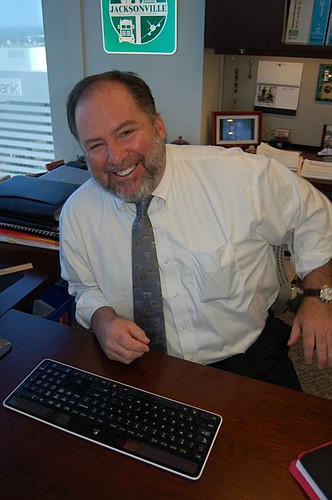
Imagine a world where 85 percent of people who have to appear in family court with life-changing issues can’t afford to hire an attorney. That means they’re not represented when they go before the judge.
Imagine a world where it’s not just people with low incomes who can’t afford representation.
Imagine that only 17 percent of middle-income people can afford to pay for the services of an attorney when they have a legal matter, such as foreclosures that have swept across the country in recent years.
It’s not fiction. It’s the reality for Florida residents — and The Florida Bar Foundation is dedicated to changing those statistics.
“We think the justice system works best when it works for everyone,” said Donny MacKenzie, pro bono partner at Holland & Knight’s Jacksonville office and 2015-16 president of the foundation.
“Justice is not justice if it’s only there for the rich,” he said.
A member of the foundation’s board since 2007, MacKenzie, 52, developed his dedication to pro bono practice and equal access to justice while he was in law school at Florida State University.
He performed his first pro bono work while still in law school and increased involvement when he joined Holland & Knight in 1992.
He discovered a culture of pro bono service and became involved with Jacksonville Area Legal Aid, of which he is a past president. “It has been a love affair ever since,” MacKenzie said.
The foundation administers the Interest on Trust Accounts program — commonly referred to as IOTA — that uses the interest on Florida attorneys’ trust accounts to help support legal aid programs.
MacKenzie said with interest rates remaining at all-time lows, even with $5 billion in trust account balances on any given day, the return on investment is small.
The fund generated more than $44 million in 2007-08, but only $5.3 million in 2013-14.
With financial resources challenged until interest rates improve, the foundation, in cooperation with the Florida Commission on Access to Civil Justice, is helping change the way the legal profession and its clients can use technology to improve outcomes both in and out of court.
MacKenzie said it’s presently in the conceptual stage, but the foundation and commission are supporting the development of an Internet portal that could help people with legal issues find the guidance they need, whether that be pro bono services, finding an attorney for a fee or even self-representation when appropriate.
“It would be a triage system; a statewide gateway,” he said.
Modeled after similar successful online intake sites in other states, the idea is to offer a user-friendly resource that will improve equal access to the legal system.
“It will point you in the right direction,” he said. “If you don’t qualify for legal aid, it would direct you to another source, perhaps an attorney who performs pro bono work.”
Part of the process, MacKenzie said, will be to make attorneys aware of the proposed system’s advantages in terms of equal access and also make them aware that if implemented, the system will not reduce the ability of lawyers to find clients.
In fact, he said, the goal is for attorneys to embrace the technology rather than fear it.
“The best analogy is that it would be like an online income tax filing service,” said Mac-Kenzie. “If you think about it, TurboTax hasn’t destroyed the accounting business. It’s created a niche where people can do things (for) ... themselves.”
The foundation’s goal is to help the legal profession evolve with technology and the market and to involve all constituencies to make legal services more universally available.
“This is not a Republican versus Democrat issue or a liberal versus conservative issue. It’s a societal issue,” MacKenzie said. “We think the justice system works best when it works for everyone.”
In the end, it will be up to the profession to initiate and then implement better access to justice for everyone.
“Lawyers are uniquely qualified to affect positive change and we can do it quietly and behind the scenes,” said MacKenzie. “Lawyers have a virtual monopoly on the justice system, so it’s incumbent upon us to make the system work.”
@drmaxdowntown
(904) 356-2466